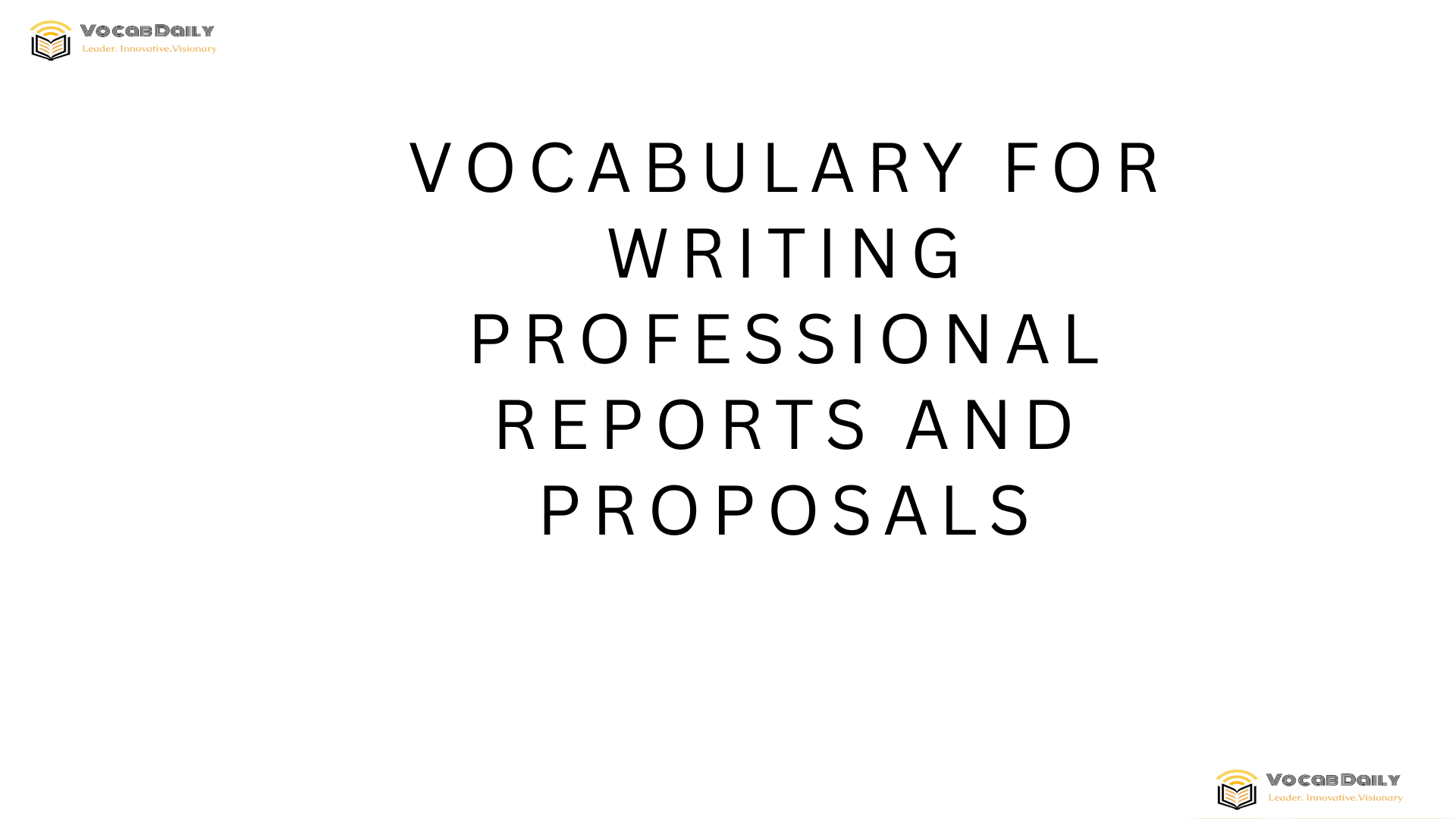Vocabulary for Writing Professional Reports and Proposals
Essential Business English Vocabulary for Reports
When writing professional reports, it is crucial to use precise and formal vocabulary that clearly communicates your findings and analysis. Effective business writing demands clarity and professionalism, especially when addressing stakeholders, clients, or senior management. Words like analyze, evaluate, and assess are central to describing processes and outcomes in reports. These verbs demonstrate critical thinking and provide readers with insight into how data or situations were examined.
Additionally, nouns such as summary, overview, and findings serve to structure your document and organize the report’s content logically. Adjectives including significant, relevant, and comprehensive help emphasize important points and convey thoroughness. Using this vocabulary effectively enhances the professionalism of the report and facilitates understanding among readers.
Key Terms for Structuring Proposals
Proposals require a different but equally precise set of vocabulary to persuade and inform potential clients or decision-makers. Words like objective, strategy, and scope define the purpose and boundaries of the proposed project or solution. The term deliverables is commonly used to describe tangible outcomes or products that the proposal promises to provide.
Moreover, verbs such as recommend, propose, and justify are fundamental to framing your arguments and providing rationale for your plan. Phrases like cost-effective, innovative approach, and risk mitigation appeal to business priorities and concerns, making your proposal persuasive and practical.
Business Vocabulary for Data Presentation
Data presentation is often a critical part of both reports and proposals. Using the right vocabulary to describe data helps ensure that your audience understands the importance of the information presented. Terms such as trend, statistic, and correlation explain relationships and patterns in data. Words like increase, decrease, and fluctuation describe changes over time clearly.
Expressions such as according to the data, the results indicate, and evidence suggests frame data findings in a way that supports your conclusions. Using precise measurement-related vocabulary such as percentage, ratio, and benchmark helps quantify your statements and make your document more factual and credible.
Formal Vocabulary for Recommendations and Next Steps
When writing professional reports and proposals, especially in the final sections, recommending actions and outlining next steps demands careful word choice. Words like recommend, suggest, and advocate are used to present well-considered advice. It is important to appear authoritative but respectful by using phrases like it is advisable to, we propose that, and it would be beneficial to.
Additionally, linking words and phrases are essential to ensure logical flow. Phrases such as subsequently, following this, and in the next phase guide readers through your proposed plan of action. Expressing potential outcomes through vocabulary like expected results, anticipated benefits, and long-term impact helps stakeholders visualize the value of your suggestions.
Tone and Politeness in Professional Business Writing
Maintaining a professional and polite tone is vital in business English. Softening language helps to avoid sounding too direct or demanding, which can sometimes appear harsh in business communication. Words such as consider, may, and could offer polite suggestions rather than commands. For example, “We suggest the team may consider…” sounds more diplomatic than “You must…”
Additionally, including polite phrases like please find attached, we appreciate your consideration, and should you have any questions makes your writing more courteous and professional. This vocabulary supports positive relationships and reinforces respect in your correspondence, reports, and proposals.
Useful Connectors and Transition Words
Transition words and connectors are vital for ensuring that your report or proposal reads smoothly and logically. Words like however, moreover, and therefore show relationships between ideas, whether contrasting, adding information, or drawing conclusions. Examples include, “However, the data suggests…”, “Moreover, this approach increases efficiency,” and “Therefore, we recommend…”.
Other helpful connectors include in addition, as a result, and consequently, which aid in linking causes and effects clearly. Using this type of vocabulary helps guide readers through complex information without confusion, making the writing both professional and reader-friendly.
Avoiding Common Vocabulary Mistakes
When writing professional reports and proposals, it is important to avoid vocabulary mistakes that can confuse readers or weaken your message. For instance, avoid overly informal words such as stuff, thing, or slang expressions that reduce professionalism. Instead, use precise terms like items, assets, or resources.
Also, watch out for clichés and overused phrases such as think outside the box or at the end of the day, which may sound unprofessional in formal documents. Opt for clear, straightforward language to maintain credibility. Proofreading and using a business English vocabulary checklist can prevent these common errors.
Vocabulary to Highlight Risks and Challenges
Reports and proposals often need to address potential risks and challenges honestly while maintaining a constructive tone. Professional vocabulary for this purpose includes words such as obstacle, constraint, risk, and uncertainty. These terms help identify problems without sounding alarmist.
Moreover, explaining mitigation strategies involves verbs like manage, minimize, and monitor. Phrases like risk assessment, contingency plan, and proactive approach demonstrate that you are prepared to handle challenges and protect project success. Using this vocabulary strategically can reassure stakeholders that risks are acknowledged and addressed professionally.
Enhancing Persuasion with Positive Business Vocabulary
Using positive vocabulary increases the persuasive power of your proposals and reports. Words such as opportunity, advantage, benefit, and growth emphasize the value of your recommendations or findings. Expressing confidence with terms like feasible, effective, and sustainable helps build trust in your solutions.
Additionally, emphasizing collaboration and partnership with words like stakeholders, team effort, and synergy can encourage buy-in from readers. This positive vocabulary creates a forward-looking tone that inspires action and aligns interests for mutual success.
Also check out VocabDaily workbook collections.

Leave a Reply